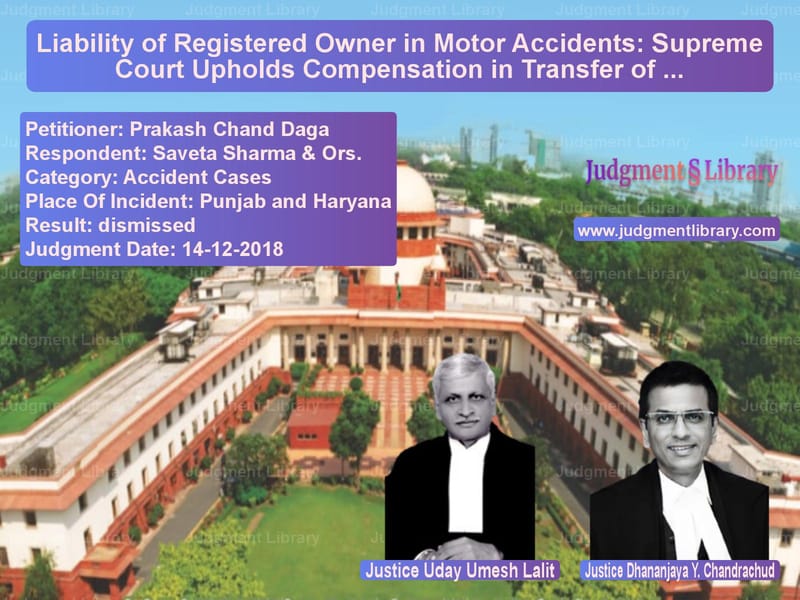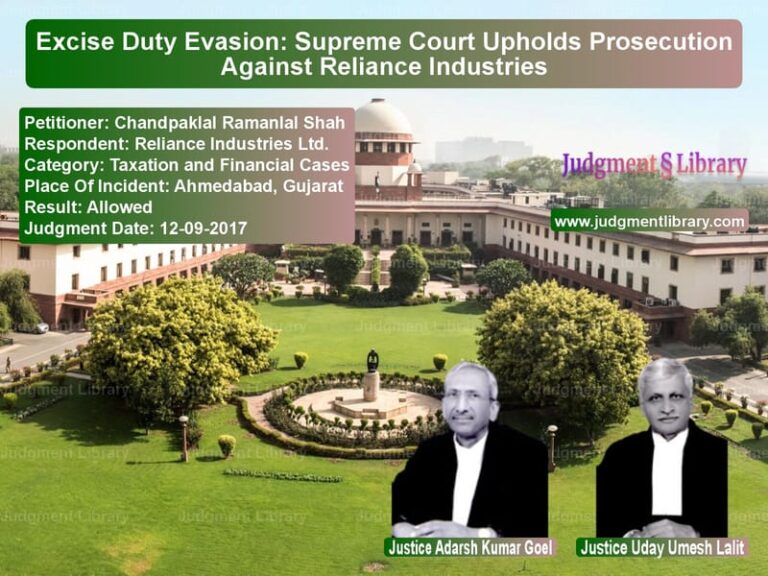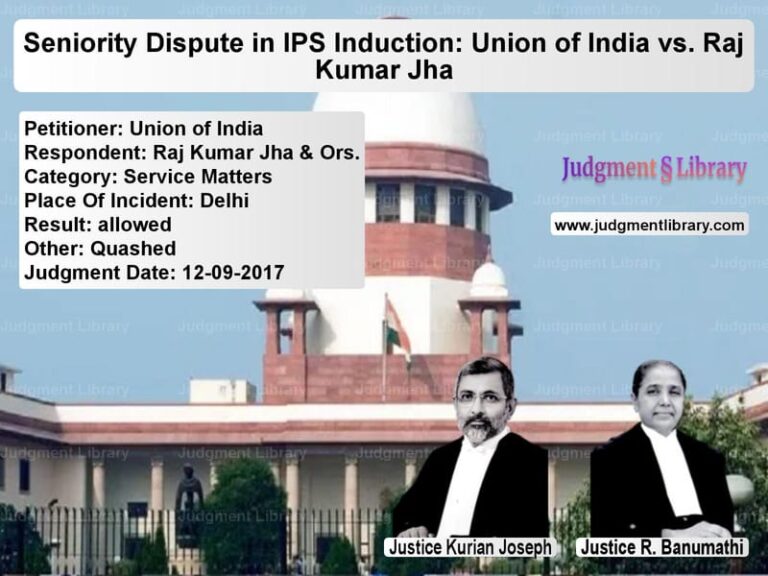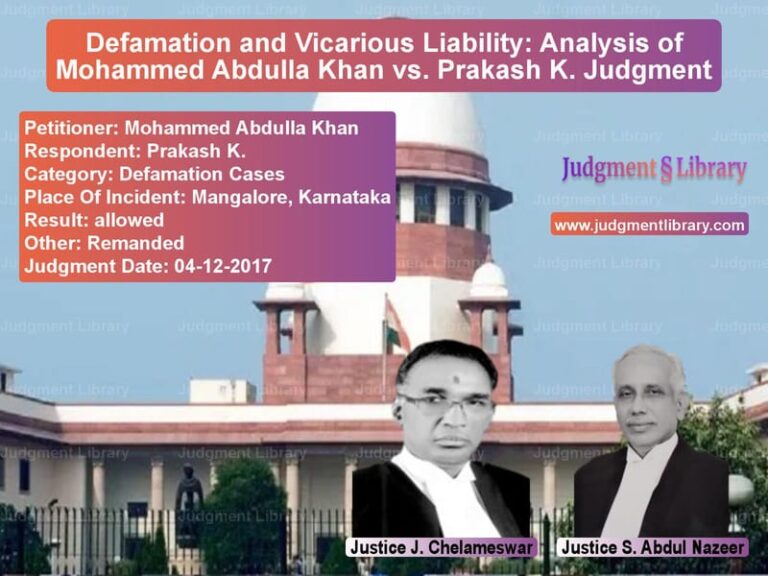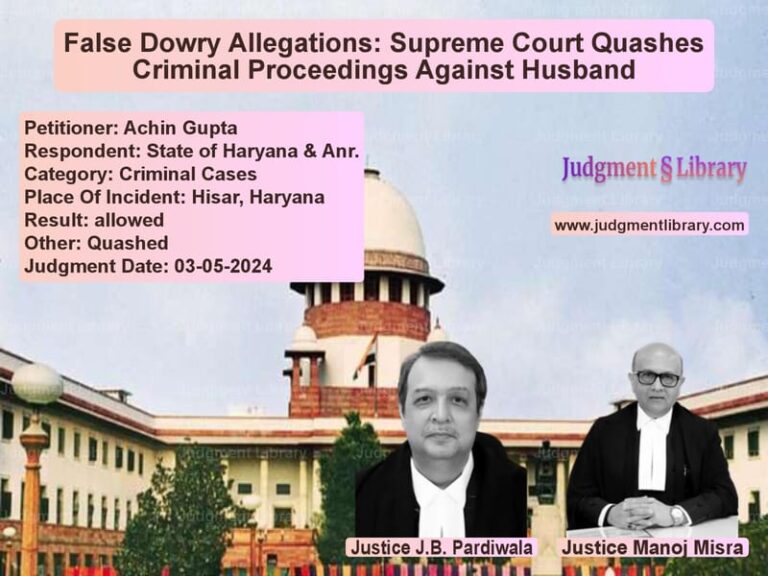Liability of Registered Owner in Motor Accidents: Supreme Court Upholds Compensation in Transfer of Vehicle Case
The case of Prakash Chand Daga vs. Saveta Sharma & Ors. revolves around the crucial issue of ownership liability in motor accidents, particularly when a vehicle is sold but the transfer of ownership is not updated in the Regional Transport Office (RTO) records. The Supreme Court’s judgment on December 14, 2018, reaffirmed that a registered owner remains liable for third-party compensation claims until the name change is officially recorded in the RTO, even if the vehicle has been sold.
The ruling clarifies the interpretation of the Motor Vehicles Act, 1988, particularly Section 2(30), which defines the ‘owner’ of a motor vehicle, and Section 50, which prescribes the procedure for transferring ownership. The judgment sets a precedent for ensuring that legal liability aligns with RTO records rather than informal agreements between parties.
Background of the Case
The appellant, Prakash Chand Daga, was the original owner of a Santro car, which he sold to Saveta Sharma (the first respondent) on 11 September 2009. The vehicle was involved in an accident on 9 October 2009, causing injuries to Rakesh Kumar (the second respondent). The Motor Accident Claims Tribunal (MACT) assessed a compensation of Rs. 12.47 lakhs and held the driver and first respondent liable for the amount.
However, the High Court of Punjab and Haryana ruled that since the vehicle’s registration had not been officially transferred, the liability rested with the original registered owner, Prakash Chand Daga. The insurance company was directed to pay the compensation but granted the right to recover the amount from the appellant.
Legal Issues Considered
The Supreme Court examined the following key issues:
- Whether the liability of a registered owner ceases after selling the vehicle, even if the transfer is not recorded in the RTO.
- Whether the provisions of Section 50 of the Motor Vehicles Act protect a seller from liability during the 30-day transfer period.
- The impact of legal precedents, including Naveen Kumar vs. Vijay Kumar & Ors. (2018) and Pushpa alias Leela vs. Shakuntala (2011), on ownership liability.
Arguments by the Appellant
The appellant contended:
- The vehicle was sold before the accident, and the possession was transferred to the first respondent.
- Under Section 50 of the Motor Vehicles Act, the transferor has 14 days to notify the RTO, and the transferee has 30 days to apply for ownership change. Since the accident occurred within this period, he should not be held liable.
- The liability should rest with the transferee, who had de facto control over the vehicle.
Arguments by the Respondents
The insurance company and the injured claimant argued:
- Section 2(30) of the Motor Vehicles Act defines ‘owner’ as the person in whose name the vehicle is registered.
- The legal owner in the RTO records remains responsible for third-party claims, even if they no longer possess the vehicle.
- The Supreme Court’s ruling in Naveen Kumar vs. Vijay Kumar & Ors. held that a seller remains liable until the registration is updated.
Supreme Court’s Judgment
The Supreme Court, comprising Justices Uday Umesh Lalit and Dhananjaya Y. Chandrachud, upheld the High Court’s decision, reaffirming that the legal liability of a vehicle’s registered owner does not end upon sale unless the RTO records reflect the transfer. The key observations included:
- “It is well settled that for the purposes of fixing such liability, the concept of ownership has to be understood in terms of the specific definition of ‘owner’ under Section 2(30) of the Motor Vehicles Act.”
- “Even though in law there would be a transfer of ownership of the vehicle, that by itself would not absolve the party, in whose name the vehicle stands in RTO records, from liability to a third person.”
- “The timelines under Section 50 for reporting transfers are meant to facilitate RTO record updates and do not shield an owner from liability in third-party claims.”
- “Merely because the vehicle was transferred does not mean that such registered owner stands absolved of his liability to a third person.”
Key Takeaways from the Judgment
- RTO Records Determine Ownership: Liability remains with the registered owner until the RTO updates the records, regardless of possession or sale agreements.
- Transfer of Possession Does Not Mean Transfer of Liability: Even if the buyer takes possession and control, the seller is still responsible for legal claims until the ownership change is formally recorded.
- 30-Day Rule Does Not Grant Immunity: The time allowed for updating registration does not absolve the seller from liability if an accident occurs before the name change.
- Protection of Third-Party Rights: The ruling ensures that accident victims are not burdened with tracing multiple owners for compensation claims.
Final Directions
The Supreme Court dismissed the appeal and ruled:
- The High Court was correct in holding the appellant liable as the registered owner at the time of the accident.
- The insurance company would pay the compensation and had the right to recover the amount from the appellant.
Conclusion
This judgment serves as an essential precedent in motor accident liability cases. It reinforces that ownership, as recorded in the RTO, determines legal responsibility in third-party claims. Vehicle sellers must ensure the official transfer of ownership in the RTO records to avoid unexpected liabilities.
The decision protects accident victims by preventing ownership disputes from delaying compensation. It also highlights the importance of timely updating vehicle ownership details to avoid legal and financial consequences.
Petitioner Name: Prakash Chand Daga.Respondent Name: Saveta Sharma & Ors..Judgment By: Justice Uday Umesh Lalit, Justice Dhananjaya Y. Chandrachud.Place Of Incident: Punjab and Haryana.Judgment Date: 14-12-2018.
Don’t miss out on the full details! Download the complete judgment in PDF format below and gain valuable insights instantly!
Download Judgment: Prakash Chand Daga vs Saveta Sharma & Ors. Supreme Court of India Judgment Dated 14-12-2018.pdf
Direct Downlaod Judgment: Direct downlaod this Judgment
See all petitions in Motor Vehicle Act
See all petitions in Compensation Disputes
See all petitions in Negligence Claims
See all petitions in Judgment by Uday Umesh Lalit
See all petitions in Judgment by Dhananjaya Y Chandrachud
See all petitions in dismissed
See all petitions in supreme court of India judgments December 2018
See all petitions in 2018 judgments
See all posts in Accident Cases Category
See all allowed petitions in Accident Cases Category
See all Dismissed petitions in Accident Cases Category
See all partially allowed petitions in Accident Cases Category

